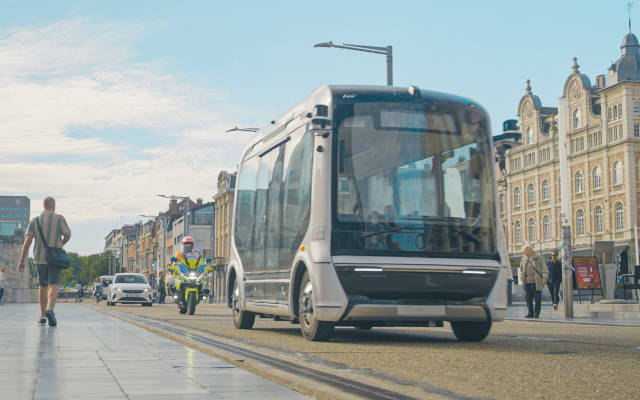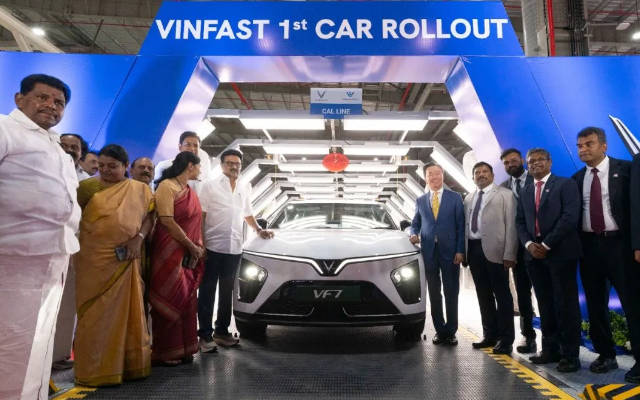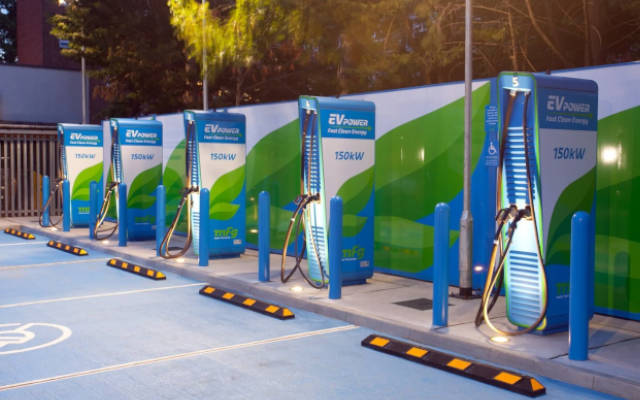 EDITOR'S PICK
EDITOR'S PICK
WeRide Enters Belgium as Autonomous Robobus Rolls Into Leuven
11 Sep 2025 | Synopsis
 WeRide launched its autonomous Robobus in Leuven, Belgium, marking its 11th global market. In partnership with De Lijn and Espaces-Mobilités, the pilot will run through January 2026, aiming to improve first- and last-mile transit. Mapping begins now, with public testing mid-September. The project reflects Belgium’s push for smart mobility and AV integration.
WeRide launched its autonomous Robobus in Leuven, Belgium, marking its 11th global market. In partnership with De Lijn and Espaces-Mobilités, the pilot will run through January 2026, aiming to improve first- and last-mile transit. Mapping begins now, with public testing mid-September. The project reflects Belgium’s push for smart mobility and AV integration.What's Keeping The Indian Middle Class From Driving An Electric Car?
11 Sep 2025 | Synopsis
 India’s middle class is hesitant to adopt EVs due to high import prices, limited public charging, and range anxiety. Tesla’s Model Y costs ₹6M ($68K), far above mainstream affordability. Local production is key—Vietnam’s VinFast and India’s Tata Motors offer EVs closer to ₹1–2.3M. With EVs at just 5.3% market share, scaling infrastructure and lowering costs are critical for broader adoption.
India’s middle class is hesitant to adopt EVs due to high import prices, limited public charging, and range anxiety. Tesla’s Model Y costs ₹6M ($68K), far above mainstream affordability. Local production is key—Vietnam’s VinFast and India’s Tata Motors offer EVs closer to ₹1–2.3M. With EVs at just 5.3% market share, scaling infrastructure and lowering costs are critical for broader adoption.Small Modular Reactors and the Big Questions of Cost & Waste
11 Sep 2025 | Synopsis
 A new study by Kim and Macfarlane finds small modular reactors (SMRs) face steep cost overruns and complex waste challenges. Promised savings rely on mass production that hasn't materialized, while some SMR designs may generate 2–30× more waste per unit of energy. With few commercial deployments and high uncertainty, SMRs remain a high-risk option compared to proven clean technologies.
A new study by Kim and Macfarlane finds small modular reactors (SMRs) face steep cost overruns and complex waste challenges. Promised savings rely on mass production that hasn't materialized, while some SMR designs may generate 2–30× more waste per unit of energy. With few commercial deployments and high uncertainty, SMRs remain a high-risk option compared to proven clean technologies.Why EV World Supports the New Heatwave Attribution Study
11 Sep 2025 | Synopsis
 A peer-reviewed Nature study links 213 heatwaves since 2000 to human-caused climate change, showing emissions from 180 major fossil fuel and cement producers made 53 of them "virtually impossible" without global warming. The study uses EM-DAT data and attribution science to quantify how specific corporate emissions increased deadly heatwave risks, offering a scientific basis for accountability in climate-related harm.
A peer-reviewed Nature study links 213 heatwaves since 2000 to human-caused climate change, showing emissions from 180 major fossil fuel and cement producers made 53 of them "virtually impossible" without global warming. The study uses EM-DAT data and attribution science to quantify how specific corporate emissions increased deadly heatwave risks, offering a scientific basis for accountability in climate-related harm.The UK, Netherlands, & California Have More EV Charging Ports Than Gas Pump Nozzles?
10 Sep 2025 | Synopsis
 The UK, Netherlands, and California now have more public EV charging ports than gas pump nozzles, marking a symbolic shift in transportation infrastructure. This milestone reflects rapid growth in electrification, policy support, and consumer adoption. It signals that EVs are not just viable - they're becoming dominant in key regions leading the clean mobility transition.
The UK, Netherlands, and California now have more public EV charging ports than gas pump nozzles, marking a symbolic shift in transportation infrastructure. This milestone reflects rapid growth in electrification, policy support, and consumer adoption. It signals that EVs are not just viable - they're becoming dominant in key regions leading the clean mobility transition.
 EVWorld Exclusive
EVWorld Exclusive
Unlocking Heat's Hidden Potential: How a Nanoscale Discovery Could Transform Everyday Tech
24 Oct 2025 |  A recent nanoscale physics breakthrough reveals heat can transfer across tiny gaps far more efficiently than expected - up to 100 times greater than classical predictions. This could revolutionize cooling and energy systems in electronics, EVs, and smart appliances. While engineering challenges remain, early applications may emerge within 3-5 years, with broader consumer adoption possible in the next decade. The future of heat management may be silent, solid-state, and radically efficient.
A recent nanoscale physics breakthrough reveals heat can transfer across tiny gaps far more efficiently than expected - up to 100 times greater than classical predictions. This could revolutionize cooling and energy systems in electronics, EVs, and smart appliances. While engineering challenges remain, early applications may emerge within 3-5 years, with broader consumer adoption possible in the next decade. The future of heat management may be silent, solid-state, and radically efficient.
Turning the Energy Crunch into a Smart Grid Revolution
24 Oct 2025 |  America's energy crunch is not about supply - it's about coordination. Virtual power plants and vehicle-to-grid systems offer a scalable, software-driven solution to rising demand from AI, EVs, and climate volatility. By turning homes, vehicles, and businesses into active grid assets, and aligning policy with technology, the U.S. can build a smarter, more resilient energy future without building more power plants. The tools exist - now it's time to connect them.
America's energy crunch is not about supply - it's about coordination. Virtual power plants and vehicle-to-grid systems offer a scalable, software-driven solution to rising demand from AI, EVs, and climate volatility. By turning homes, vehicles, and businesses into active grid assets, and aligning policy with technology, the U.S. can build a smarter, more resilient energy future without building more power plants. The tools exist - now it's time to connect them.
Auto Retail in 2025: Bridging the Trust Gap Between Dealers and Buyers
24 Oct 2025 |  The 2025 Urban Science and Harris Poll report reveals a growing disconnect between dealers and buyers. While dealers embrace EVs, AI, and digital tools, many buyers remain cautious - especially about full electrification and online-only retail. Brand loyalty is weakening, and policy clarity is key to adoption. The future of auto retail depends on bridging trust, flexibility, and infrastructure gaps.
The 2025 Urban Science and Harris Poll report reveals a growing disconnect between dealers and buyers. While dealers embrace EVs, AI, and digital tools, many buyers remain cautious - especially about full electrification and online-only retail. Brand loyalty is weakening, and policy clarity is key to adoption. The future of auto retail depends on bridging trust, flexibility, and infrastructure gaps.
Electric Icons in the Making: Audi Concept C vs. Chevrolet Corvette EV
23 Oct 2025 |  Audi's Concept C previews a refined electric GT built on the mature PPE platform, likely arriving by 2026. Chevrolet's Corvette EV promises supercar performance but faces packaging and thermal challenges. Audi is closer to production; Corvette remains in early development. Both reflect divergent strategies in electrifying legacy sports cars, with Audi emphasizing platform maturity and Chevrolet pursuing brand continuity through engineering innovation.
Audi's Concept C previews a refined electric GT built on the mature PPE platform, likely arriving by 2026. Chevrolet's Corvette EV promises supercar performance but faces packaging and thermal challenges. Audi is closer to production; Corvette remains in early development. Both reflect divergent strategies in electrifying legacy sports cars, with Audi emphasizing platform maturity and Chevrolet pursuing brand continuity through engineering innovation.
Electrification Is Not an Oversimplification
23 Oct 2025 |  Despite critiques that the quest for global electrification is "simplistic", the transition is strategic and necessary. Grid upgrades, battery innovation, and tailored policies make electrification viable. Sodium-ion batteries and recycling reduce material risk. Compared to fossil fuels, electrification offers cleaner, safer, and more resilient systems. Complexity demands better design - not delay.
Despite critiques that the quest for global electrification is "simplistic", the transition is strategic and necessary. Grid upgrades, battery innovation, and tailored policies make electrification viable. Sodium-ion batteries and recycling reduce material risk. Compared to fossil fuels, electrification offers cleaner, safer, and more resilient systems. Complexity demands better design - not delay.
 26 Oct 2025 17:41:29 UTC |
RECENT PODCASTS
Xiami YU7 Ferrari SUV Knock Off - States Rights - Kenya E-Cycles- Tesla Cybertruck
SEARCH RSSTREAM
 16 New Postings In Past 24 Hours
16 New Postings In Past 24 Hours
Category:mobility
Region:NoAmerica
Date:26 Oct 2025
Category:mobility
Region:AsiaPacific
Date:26 Oct 2025
Category:recall
Region:NoAmerica
Date:26 Oct 2025
Category:energy
Region:Europe
Date:26 Oct 2025
Category:mobility
Region:Europe
Date:26 Oct 2025
Category:policy
Region:NoAmerica
Date:26 Oct 2025
Category:mobility
Region:NoAmerica
Date:26 Oct 2025
Category:mobility
Region:Europe
Date:26 Oct 2025
Category:mobility
Region:Europe
Date:26 Oct 2025
Category:energy
Region:NoAmerica
Date:26 Oct 2025
Category:finance
Region:NoAmerica
Date:26 Oct 2025
Category:environment
Region:Global
Date:25 Oct 2025
Category:finance
Region:NoAmerica
Date:25 Oct 2025
Category:finance
Region:NoAmerica
Date:25 Oct 2025
Category:mobility
Region:Europe
Date:25 Oct 2025
Category:energy
Region:Europe
Date:25 Oct 2025
Category:environment
Region:MidEast
Date:25 Oct 2025
Category:mobility
Region:AsiaPacific
Date:25 Oct 2025
Category:finance
Region:NoAmerica
Date:25 Oct 2025
Category:mobility
Region:Global
Date:25 Oct 2025